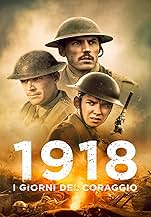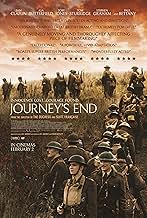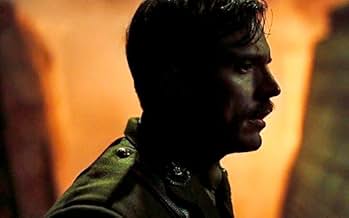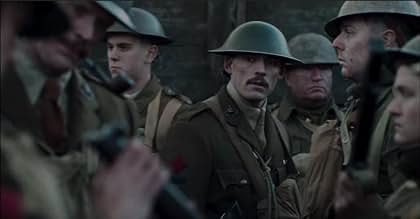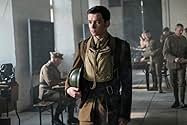IMDb RATING
6.7/10
12K
YOUR RATING
Set in a dugout in Aisne in 1918, it is the story of a group of British officers, led by mentally-disintegrating young Officer Stanhope, as they await their fate.Set in a dugout in Aisne in 1918, it is the story of a group of British officers, led by mentally-disintegrating young Officer Stanhope, as they await their fate.Set in a dugout in Aisne in 1918, it is the story of a group of British officers, led by mentally-disintegrating young Officer Stanhope, as they await their fate.
- Awards
- 4 wins & 3 nominations total
Featured reviews
I just want to provide a quick calibration of what people should expect from this movie because some of the reviewers seem to have had a misconception of what this movie was supposed to be about. This is not a war movie - it's a movie about war. Specifically, the affects of trench warfare on a group of soldiers. Too that end, the movie is absolutely brilliant from the moment it begins to the moment it ends. You will not see long drawn out battle scenes, hand to hand combat, fire-fights, bloody carnage or anything else you've recently seen in Hacksaw Ridge, Lone Survivor or Fury. What you will see is the persistent and inevitable deterioration of the innocence and humanity of the characters as their fate, which they all know is coming, slowly but surely creeps up on them from one day to the next. Many other reviewers have used the term, "disturbing", to describe this movie and I agree 100%. It is highly disturbing, on a psychological level. You won't leave this movie feeling good or motivated to join the military; you will leave it with a loss to understand why humanity ends up in situations like this to begin with.
"Journey's End" makes for a claustrophobic and tense movie experience. It's quite clearly a film adaptation of a stage play, but it's a surprise (to me at least) that the stage play - penned by R.C. Sherriff - dates back to 1928 and was first performed in London by a young Laurence Olivier.
You might say "A filmed stage play? Hm... I'm not sure about that". But actually, it works really well, adding brilliantly to the claustrophobic nature of the piece but - more importantly - largely eschewing "action scenes" to focus in on the dramatic relationships between the officers in their dugout and the men in the trenches above.
The plot is a simple one. Set in the spring of 1918 (arguably, the movie might have been even more powerful had its release been delayed by about 6 weeks), Captain Stanhope (Sam Claflin, "Me Before You", "Their Finest") leads a company of men marching into position in a trench near Saint-Quentin, Aisne for a six-day tour of duty. Given they are one of 1,800 such companies on the Western Front, it's unfortunately their bad luck that the German's "spring offensive" is forecast to happen imminently. As Stanhope's CO (the excellent Robert Glennister, "Live by Night", TV's "Hustle") makes clear, and as the film's title might also suggest, this is forecast to be a one-way trip.
With immaculate timing, squeaky-keen young recruit Lieutenant Raleigh (Asa Butterfield, "Hugo") uses his brass-connections to join the company, since he knows Stanhope from his schooldays. Indeed, Stanhope is his sister's beau. But Raleigh soon discovers that Stanhope is no longer the 'affable chap' he was....
Butterfield is marvelously cast as the perky new recruit, all wide-eyed and eager on arrival but completely ill-equipped for what he is to see and experience in a confined society being stretched beyond breaking point. Claflin as well is superb, and must have spent hours in front of a mirror trying to perfect his haunted expression. The range of emotions he delivers through those eyes is just extraordinary. Finally rounding out the star-turns of the officers are Paul Bettany ("Avengers: Age of Ultron") as the avuncular Osborne and Tom Sturridge ("Far From The Madding Crowd") as the shell-shocked and useless Hibbert.
Those of you familiar with the splendid "Black Adder Goes Forth" will know the comic role played by Tony Robinson as Baldrick with his strange culinary concoctions. In this film Toby Jones ("Atomic Blonde", "Dad's Army") fills that role and similarly has some comic lines to add - just a touch of - much needed light-relief to the tension.
The film has a necessarily melancholic feel, but (for me) it's rather over-egged by the sonorous cello score by Natalie Holt and Hildur Gudnadóttir. (Again, reflecting our different tastes, I'll point out that my wife found the music fitting and not as annoying and intrusive as I did).
Director Sean Dibb (Suite Française) has here delivered a tense and very well-executed movie that ably demonstrates the British "stiff upper lip" in public - and the weak whiskey-soaked psychosis in private - of men under the most unbearable stress imaginable. Recommended... but go expecting something that's more drama than World War One 'action'.
(For the full graphical review, please visit bob-the-movie-man.com. Thanks.)
You might say "A filmed stage play? Hm... I'm not sure about that". But actually, it works really well, adding brilliantly to the claustrophobic nature of the piece but - more importantly - largely eschewing "action scenes" to focus in on the dramatic relationships between the officers in their dugout and the men in the trenches above.
The plot is a simple one. Set in the spring of 1918 (arguably, the movie might have been even more powerful had its release been delayed by about 6 weeks), Captain Stanhope (Sam Claflin, "Me Before You", "Their Finest") leads a company of men marching into position in a trench near Saint-Quentin, Aisne for a six-day tour of duty. Given they are one of 1,800 such companies on the Western Front, it's unfortunately their bad luck that the German's "spring offensive" is forecast to happen imminently. As Stanhope's CO (the excellent Robert Glennister, "Live by Night", TV's "Hustle") makes clear, and as the film's title might also suggest, this is forecast to be a one-way trip.
With immaculate timing, squeaky-keen young recruit Lieutenant Raleigh (Asa Butterfield, "Hugo") uses his brass-connections to join the company, since he knows Stanhope from his schooldays. Indeed, Stanhope is his sister's beau. But Raleigh soon discovers that Stanhope is no longer the 'affable chap' he was....
Butterfield is marvelously cast as the perky new recruit, all wide-eyed and eager on arrival but completely ill-equipped for what he is to see and experience in a confined society being stretched beyond breaking point. Claflin as well is superb, and must have spent hours in front of a mirror trying to perfect his haunted expression. The range of emotions he delivers through those eyes is just extraordinary. Finally rounding out the star-turns of the officers are Paul Bettany ("Avengers: Age of Ultron") as the avuncular Osborne and Tom Sturridge ("Far From The Madding Crowd") as the shell-shocked and useless Hibbert.
Those of you familiar with the splendid "Black Adder Goes Forth" will know the comic role played by Tony Robinson as Baldrick with his strange culinary concoctions. In this film Toby Jones ("Atomic Blonde", "Dad's Army") fills that role and similarly has some comic lines to add - just a touch of - much needed light-relief to the tension.
The film has a necessarily melancholic feel, but (for me) it's rather over-egged by the sonorous cello score by Natalie Holt and Hildur Gudnadóttir. (Again, reflecting our different tastes, I'll point out that my wife found the music fitting and not as annoying and intrusive as I did).
Director Sean Dibb (Suite Française) has here delivered a tense and very well-executed movie that ably demonstrates the British "stiff upper lip" in public - and the weak whiskey-soaked psychosis in private - of men under the most unbearable stress imaginable. Recommended... but go expecting something that's more drama than World War One 'action'.
(For the full graphical review, please visit bob-the-movie-man.com. Thanks.)
I was fortunate enough to see the premiere of this film at the London Film Festival, and went in with no prior knowledge of the story or the characters, and was blown away by the impact this film has. Each actor suited their role perfectly, with Sam Claffin adding a smooth, sophisticated yet equally mysterious spin on the title character, Toby Jones adding fantastic one-liner humour to give the script more depth, and the other characters making the film's narrative put you on the edge of your seat. Usually I brush over war films, as I find the production and aesthetic quite similar. However, this film left me with lots of powerful thoughts and I am grateful to be one of the first to see it! Its now clear to see that this was based on a play, as the majority of the scenes were shot within the same set, with the focus on the characters' progression and the narrative as a whole, but this really worked! This is a film I highly recommend seeing- superb acting, released at a fitting time (its release being 100 years after the end of WW1), beautiful cinematography, a powerful script, and so much more! I will be seeing this again at the next given chance. So stop watching these big Hollywood remakes, be ready to be lost in the charm of this war film, and witness something quite special, that will hit you hard!- Sam Bishop
To me, "Journey's End" is a far better film than the rating may lead one to believe. It's an intense war film with extremely realistic sets and clothing. The film puts you right into the trenches of WWI in way that I've never experienced before in a film.
Adapted from a play, "Journey's End" takes place primarily right in the trenches and underground officer's quarters, with the characteristic lack of set changes that come with plays and films adapted from them. While the movies are nothing alike in any way, I was reminded of the classic film "Glengarry Glen Ross," as it was also adapted from a play. When a film is adapted from a play and done right, it gains a certain intensity that is sometimes lacking in standard films. This played perfectly into the WWI trench atmosphere - a constricted, confined, intense space.
These sort of movies become character focused and the actors can really shine. Therein lies my only real critique of "Journey's End," in that I found some of the acting to be a bit uneven. I have nothing against Sam Clafin (Captain Stanhope), but he failed to carry this film, even though the story is ostensibly about him. The drinking in particular bothered me - the character drank whiskey like it was water but came across as too sober and clear-eyed for it to be believable.
But overall, "Journey's End" is a compelling look at a war that perhaps doesn't get the attention it deserves. Maybe it was so horrible, we'd just rather forget all about it, but therein lies the danger.
Adapted from a play, "Journey's End" takes place primarily right in the trenches and underground officer's quarters, with the characteristic lack of set changes that come with plays and films adapted from them. While the movies are nothing alike in any way, I was reminded of the classic film "Glengarry Glen Ross," as it was also adapted from a play. When a film is adapted from a play and done right, it gains a certain intensity that is sometimes lacking in standard films. This played perfectly into the WWI trench atmosphere - a constricted, confined, intense space.
These sort of movies become character focused and the actors can really shine. Therein lies my only real critique of "Journey's End," in that I found some of the acting to be a bit uneven. I have nothing against Sam Clafin (Captain Stanhope), but he failed to carry this film, even though the story is ostensibly about him. The drinking in particular bothered me - the character drank whiskey like it was water but came across as too sober and clear-eyed for it to be believable.
But overall, "Journey's End" is a compelling look at a war that perhaps doesn't get the attention it deserves. Maybe it was so horrible, we'd just rather forget all about it, but therein lies the danger.
What a contrast to so much mediocrity and worse eg. Dunkirk. Set in the trenches in March 1918 but not really about the trenches or March 1918 at all.
Superbly cast and acted, a beautifully written reflection of a junior officer's view of the penultimate stages of WW1. Even more, this is a beautifully written reflection on the human spirit in adversity. Of course some of the senior officers are somewhat caricatured - that is what happens in real life. Of course it becomes more and more difficult with the passage of time for people to understand the mentality of empire, the public schoolboy ethos embodied by Raliegh, Maybe the same bravado and fear affects people joining violent gangs - I know not - but Raleigh is about the same age as some gang members - 18/19. Stanhope at 21/22 is a veteran of war, Uncle (Osborne - quite possibly early 30s) almost a veteran of life in their eyes.
Of course such characters have been used in films since - but this was written in 1928. It cut the new ground - others have followed.
The Roman Horace said "Dulce et decorum est pro patria mori." and it took until WW2 for Patton to say "The object of war is not to die for your country but to make the other bastard die for his." But what about sending your friends, your very best friends, your nearest and dearest to near certain death. What does that "do" to a man. Stanhope knows and through this film we can maybe glimpse that horror. What happens when there is no "cunning plan" left. Uncle knew.
Hold them off for as long as you can. In 1914, in 1918 when Journey's End is set, and again at Dunkirk ordinary men really did. No doubt there are countless other examples both before and in the last 70 years.
This film is a fitting tribute to those men.
Superbly cast and acted, a beautifully written reflection of a junior officer's view of the penultimate stages of WW1. Even more, this is a beautifully written reflection on the human spirit in adversity. Of course some of the senior officers are somewhat caricatured - that is what happens in real life. Of course it becomes more and more difficult with the passage of time for people to understand the mentality of empire, the public schoolboy ethos embodied by Raliegh, Maybe the same bravado and fear affects people joining violent gangs - I know not - but Raleigh is about the same age as some gang members - 18/19. Stanhope at 21/22 is a veteran of war, Uncle (Osborne - quite possibly early 30s) almost a veteran of life in their eyes.
Of course such characters have been used in films since - but this was written in 1928. It cut the new ground - others have followed.
The Roman Horace said "Dulce et decorum est pro patria mori." and it took until WW2 for Patton to say "The object of war is not to die for your country but to make the other bastard die for his." But what about sending your friends, your very best friends, your nearest and dearest to near certain death. What does that "do" to a man. Stanhope knows and through this film we can maybe glimpse that horror. What happens when there is no "cunning plan" left. Uncle knew.
Hold them off for as long as you can. In 1914, in 1918 when Journey's End is set, and again at Dunkirk ordinary men really did. No doubt there are countless other examples both before and in the last 70 years.
This film is a fitting tribute to those men.
Did you know
- TriviaPlaywright R.C. Sherriff had seen first-hand the effect of years of war on his friends and knew the fear and terror of waiting for an impending attack, waiting for his journey's end. The characters in the play are a reflection of the men Sherriff had served with in the 9th Battalion of the East Surrey Regiment.
- GoofsA common misconception is the myth about having your chinstrap unbuckled. It is mainly an American thing that was spread in WW2. Fact is, if the concussion was strong enough to hurt your neck or face because your chinstrap was buckled, the force of the same concussion would more than likely kill you. Having your strap undone just meant you would spend a lot of time holding your helmet on while moving fast.
- Quotes
Lieutenant Osborne: Every little noise up there, makes me feel sick.
- ConnectionsFeatured in Projector: Journey's End (2018)
- SoundtracksElevation
Written and performed by Hildur Guðnadóttir
- How long is Journey's End?Powered by Alexa
Details
Box office
- Gross US & Canada
- $161,796
- Opening weekend US & Canada
- $11,798
- Mar 18, 2018
- Gross worldwide
- $970,809
- Runtime1 hour 47 minutes
- Color
- Aspect ratio
- 1.85 : 1
Contribute to this page
Suggest an edit or add missing content








